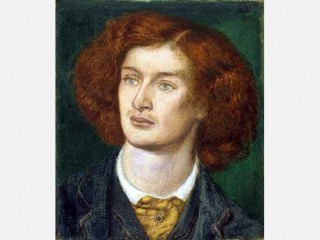
Algernon Charles Swinburne biography
Date of birth : 1837-04-05
Date of death : 1909-04-10
Birthplace : London, UK
Nationality : British
Category : Famous Figures
Last modified : 2010-11-20
Credited as : Poet, dramatist and critic, died of pneumonia
The English poet, dramatist and critic Algernon Charles Swinburne was famous in Victorian England for the innovative versification of his poetry and infamous for his violent attacks on Victorian morality.
Algernon Charles Swinburne was born in London on April 5, 1837. He was nervous and frail from birth, but he was also fired with nervous energy and fearlessness to the point of being reckless. Much of his childhood was spent on the Isle of Wight, a circumstance that fostered his deep love of the sea. He also made frequent visits to his grandfather's estate in Northumberland, where he was fascinated by the medieval border ballads that the servants sang to him. Swinburne attended Eton from 1849 to 1853. At school he became an avid reader and won first prizes in French and Italian. The corporal punishment that was traditional at Eton may have developed the abnormal pleasure in the experience of pain that characterized his adult behavior.
Swinburne entered Balliol College, Oxford, in January 1856, and he studied there intermittently for almost 4 years. Though he continued to read widely, he chafed at academic discipline and neglected his studies. His appearance was strikingly unusual. He was abnormally short with narrow, sloping shoulders and tiny hands and feet. His eyes were green, and his disproportionately large head was topped by a great aureole of bright red hair. His appearance, plus his habit of fluttering his hands and hopping about as he excitedly talked, provoked Henry Adams to compare him to "a crimson macaw." Swinburne supplemented his astounding physique with equally bizarre behavior. He became known for his violent attacks on Christianity and on conventional morality as well as for his late hours and heavy drinking. Swinburne replaced the religious faith of his youth with political fervor, declaiming verses to a portrait of the Italian patriot Giuseppe Mazzini that he hung in his room at Oxford.
At the university Swinburne formed lasting friendships with two of Oxford's most famous scholars, Walter Pater and Benjamin Jowett. In 1857 Swinburne became intimate with the Pre-Raphaelites Dante Gabriel Rossetti, William Morris, and Edward Burne-Jones. By 1860 Swinburne's Balliol colleagues considered him "dangerous, " but his decision to leave Oxford without a degree was apparently his own. His father, greatly disturbed by his son's withdrawal, nevertheless provided him with a permanent allowance. Swinburne moved to London and devoted his life to writing.
In 1861 Swinburne began his long association with Rossetti, who exerted a steadying influence and thus enabled him to write some of his finest lyric poetry. Swinburne published two plays in 1860, The Queen Mother and Rosamond, but they received no critical notice. However, in 1865, his powerful imitation of Greek tragedy, Atlanta in Calydon, was an instant success. Most critics were entranced by the metrical virtuosity displayed in the constantly shifting rhythms of the play's choruses, and few noticed its darkly amoral theme. But Poems and Ballads, First Series, published in April 1866, made Swinburne's sensuality and anti-Christianity unmistakable. This volume contains his finest poetry—beautiful in supple and unusual rhythms, in melodious sound combinations, and in intricately extended images. The most notable poems in it were clearly intended to shock the Victorian public. The "Hymn to Proserpine" denounces Christ as the "pale Galilean, " and "Faustine, " "Laus Veneris, " "Anactoria, " and "Dolores" boldly flaunt Swinburne's sadomasochistic sexuality. The book was savagely attacked by the press, and a controversy raged. Swinburne answered in "Notes on Poems and Reviews."
In 1867 Swinburne met Mazzini, who told him to turn from "love frenzy" to the utilization of his poetic gift in the "service of the republic." The result was Songs before Sunrise (1871), a volume of poems dedicated to the cause of freedom and democracy and championing the Italian struggle for independence. In 1878 Swinburne published Poems and Ballads, Second Series, but this volume contained few poems as beautiful and none so shocking as those of the First Series. It marked the end of Swinburne's greatest poetic achievement.
Throughout this period of literary activity, Swinburne had also been living a dissolute life of heavy drinking and masochistic sexual practices. His dissipation had brought on a number of attacks similar to epileptic fits, but his amazing energy had enabled him to return each time to his frenzied style of life.
In September 1879, however, Swinburne collapsed so completely that a friend, Walter Theodore Watts-Dunton, took him to his home in Putney, a suburb of London. There Watts-Dunton imposed a regimen that probably saved Swinburne's life. The poet spent the remaining 30 years of his life with Watts-Dunton in a manner as subdued as his youth had been wild. The sober discipline imposed on him enabled Swinburne to write and to publish 23 volumes of poetry, prose, and drama during these years. But A Century of Roundels (1883) clearly showed that Swinburne's rhythmic virtuosity had degenerated into excessive fluency of meter and that the fiery radical of Oxford was no more. In spite of continued avid reading and writing, Swinburne did not develop intellectually or artistically beyond his university days. He died of pneumonia on April 10, 1909, at Putney.
















